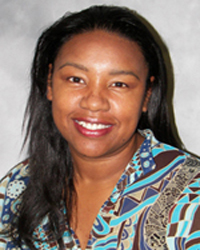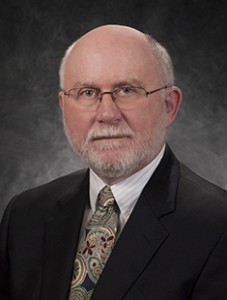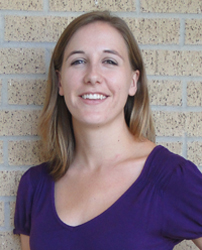 We are excited to announce that Dr. E. Lisako McKyer has recently joined the CCHD team as the new Research Development Director. Dr. McKyer has been an affiliated faculty member of CCHD since 2006 and has also served as the Center’s Co-Director of Evaluation. In her new role, half of her time will be devoted to the Center, where she will direct efforts to obtain external research funding that aligns with the Center’s research focus and supports the research interests of faculty, research staff, and students affiliated with the Center. In her remaining time, Dr. McKyer will serve as Associate Professor in the Department of Health Promotion and Community Health Sciences, where she will teach and mentor students and conduct research through her Transdisciplinary Center for Health Equity Research. Please join us in welcoming Dr. McKyer!
We are excited to announce that Dr. E. Lisako McKyer has recently joined the CCHD team as the new Research Development Director. Dr. McKyer has been an affiliated faculty member of CCHD since 2006 and has also served as the Center’s Co-Director of Evaluation. In her new role, half of her time will be devoted to the Center, where she will direct efforts to obtain external research funding that aligns with the Center’s research focus and supports the research interests of faculty, research staff, and students affiliated with the Center. In her remaining time, Dr. McKyer will serve as Associate Professor in the Department of Health Promotion and Community Health Sciences, where she will teach and mentor students and conduct research through her Transdisciplinary Center for Health Equity Research. Please join us in welcoming Dr. McKyer!
Category Archives: Uncategorized
Co-Director Feature: Dr. Kenneth McLeroy
 Dr. Kenneth McLeroy plays many roles as Co-Director of CCHD – Principal Investigator, mentor, colleague – and it is easy to say that he has significantly assisted in the overall success of the Center. Dr. McLeroy has been and continues to be on the cutting edge in his field and his contributions to public health research, teaching and service are admired by many. With Dr. McLeroy’s recent grant award from the Office of Adolescent Health, the Center would like to highlight his career-long success and influence within the field of public health.
Dr. Kenneth McLeroy plays many roles as Co-Director of CCHD – Principal Investigator, mentor, colleague – and it is easy to say that he has significantly assisted in the overall success of the Center. Dr. McLeroy has been and continues to be on the cutting edge in his field and his contributions to public health research, teaching and service are admired by many. With Dr. McLeroy’s recent grant award from the Office of Adolescent Health, the Center would like to highlight his career-long success and influence within the field of public health.
Through his seminal article in Health Education Quarterly, now known as Health Education & Behavior, An Ecological Perspective on Health Promotion Programs, Dr. McLeroy set the stage for a new generation of public health programs and research. Currently, the Social Ecological Model is one of the most widely used models in public health and the manuscript is viewed as the pivotal piece of literature describing ecological approaches to public health. The manuscript has generated over 3,000 citations, but more importantly it has changed the way we view health; instead of considering only individual components to health, the model highlights the interconnectedness of factors related to the individual, social networks, organizations, the communities in which they function, public policy at multiple levels, the physical environment, and culture.
In addition to his interest in social ecology and its application to health promotion and public health practice, Dr. McLeroy has led an industrious career in public health evaluation by working with communities to enhance their capacity to solve local health issues. Since the beginning of his career, Dr. McLeroy has been awarded 27 grants and contracts totaling over $30 million, serving as Principal Investigator on the majority of the awards. Dr. McLeroy’ s colleagues recognize him as a leading expert in community capacity and interventions, noting that he has remained true to the applied nature of public health in melding a rigorous science orientation with practical community application and benefit.
Not only have Dr. McLeroy’ s scholarly publications in research and practice made major contributions to public health, but his editorial roles with several excellent journals have resulted in his having an influential impact on the field more generally.
Since 1986, Dr. McLeroy has served in various roles on more than ten journals. He has been an Associate Editor for the Journal of Primary Prevention since 2008, a Department Editor for the American Journal of Public Health since 2005, and a Section Editor for the American Journal of Health Promotion since 1988. He has also acted as an Executive/Associate Editor for Health Education Research: Theory and Practice from 1989-1999. In addition to serving as an Editor, he has also been a member of journal editorial boards such as Health Behavior and Policy Review, AIMS Public Health, International Scholarly Research Network, American Journal of Public Health, Health Education Research: Theory and Practice, Eta Sigma Gamma, the American Journal of Health Behavior, the American Journal of Health Promotion, and Health Education and Behavior.
While his accomplishments are esteemed, Dr. McLeroy considers his greatest contribution to the field of public health to be teaching. Throughout hundreds of hours of individual discussions, meetings, classes, and conferences Dr. McLeroy has encouraged and taught his peers, students, and co-workers. As a result, he has equipped new public health scholars and professionals to enter the workforce and accomplish important tasks that are vital to the discipline.
As a teacher, Ken engages students in meaningful and challenging dialogue, positioning himself to learn from students, as well as teach them. He sees teaching as a prime opportunity to continue learning and developing his own thinking around complex public health issues. He is respectful of diversity of thought and experience, and eager to learn from others’ perspectives. His pursuit of lifelong learning permeates his work as a researcher, teacher, mentor, and administrator as he enjoys questioning what is known to push conversations into discovering that which is not yet known.
This feature was written by Dr. Whitney Garney.
Congratulations, Graduates!
The month of May is always bittersweet for CCHD as we bid farewell and wish the best for our graduating students. We are proud to announce that Ms. Audrey Young and Ms. Avery Schulze graduated at the May commencement and will be continuing their careers in public health.
Audrey Young was a graduate research assistant with the Center since March 2014. She graduated from the Texas A&M School of Public Health with her Master of Public Health degree in Health Policy and Management. Looking forward, Audrey will be serving as the Healthcare Policy Analyst for the Department of Policy and External Affairs within the Department of State Health Services.
Avery Schulze was a graduate research assistant working on the Texas Transformation 1115 Medicaid Waiver, whose offices are housed in the CCHD suite. She graduated with a Master of Public Health degree in Health Policy & Management from the Texas A&M School of Public Health. Avery plans to move into an analyst position where she will focus on health insurance eligibility, compliance, and risk management.
Jessica Chang, a graduate assistant who has served as a counselor at the Telehealth Counseling Clinic (TCC) since 2012, will be completing her pre-doctoral internship next year in neuropsychology at the Michael E. DeBakey Veterans Affairs Medical Center in Houston. Each year, only one doctoral student is selected for the neuropsychology position from an applicant pool of almost 200 individuals from across the country. Jessica was instrumental in the launch of and successful daily operations of the TCC’s second remote site located in Madisonville, TX. During her tenure at TCC, she was actively involved in service delivery, research, and training and created and ran the TCC’s first telehealth group.
The Telehealth Counseling Clinic Welcomes New Volunteers
In June, the Telehealth Counseling Clinic (TCC), welcomed 6 new volunteers and practicum students. Utilizing volunteers and practicum students is a cost-effective way to provide counseling to clients and also give the students valuable hands-on experience. The new volunteers are Mr. Semiu Gbadamosi, Mr. Parth Thakkar, Ms. Michaela Walsh, Ms. Mayra Sanchez Gonzalez, Ms. Christine Rosner, and Ms. Angel Glover. Marketing and research volunteers from the School of Public Health, Semiu and Parth, do not provide counseling, however, they assist with clinical duties such as record keeping and answering phones. Counseling volunteers from the Department of Educational Psychology, Michaela, Mayra, Christine and Angel, provide counseling and complete clinical duties such as take notes and review session tapes.
Assessment for the Brazos Valley Community Action Agency Conducted by CCHD
Last month, the Center developed a community needs assessment report for a twelve county region in Central Texas for the Brazos Valley Community Action Agency (BVCAA). CCHD utilized data collected through the household survey, community discussion groups and secondary data analysis from the Center’s 2013 Regional Health Assessment and additional data was collected in Chambers, Liberty and Waller Counties.
Community needs assessments are one of the three planning processes that Community Action Agencies are required to complete in order to receive Community Services Block Grants. These grants support programs and services aimed at decreasing poverty in communities and addressing the needs of low-income individuals. Services provided by BVCAA address employment, education, nutrition, utility assistance and/or health needs. Community Services Block Grants support BVCAA programs such as “Head Start”, a Federal program for preschool children of low-income families and “Meals on Wheels”, a food delivery service for seniors.
This Community Needs Assessment was led by Principal Investigator, Dr. Jim Burdine, and Project Team Lead, Ms. Angie Alaniz, and included the distribution and collection of four different survey instruments, comparison and analysis of secondary data and a full summary report. BVCAA will use the assessment report to inform the two other required components, the Strategic Plan and the Community Action Plan, which will illustrate the agency’s priorities and their plan to implement programs that meet the community needs.
Accepted Abstracts to the American Public Health Association Annual Meeting
Seven abstracts that were submitted by CCHD faculty and staff have been accepted for the American Public Health Association Annual Meeting which will be held in Chicago from October 31 – November 4. A list of accepted abstracts is below:
An Access to Care Model Illustrating Individual and Community-Level Predictors between Urban and Rural Populations. Whitney Garney, Ken McLeroy & Jim Burdine.
Assessment of patient satisfaction of telehealth services to underserved communities in rural Texas. U. Ghumman, Whitney Garney, Carly McCord, Alejandra Sequeira, Jeremy Saenz, Jessica Chang & Tim Elliott.
Comparison of Risk and Well-being Scores among Minorities and Caucasians Utilizing Telepsychology Services. William Bell, Alejandra Sequeira, Olufunmilola Osofundiya, Jessica Chang, Carly McCord, Timothy Elliott.
Developing a stackable CHW certification curriculum with an emphasis on mental health as part of an integrated care model. Katharine Nimmons, Eron Manusov, John Ronnau, Nick Nevers, Francisco Fernandez, Deepu George, Paula Saldana, & Dinorah Martinez.
Physical Activity Changes in Exergames over Time. Whitney Garney & Ken McLeroy.
Soliciting and incorporating CHW/promotora feedback: Lessons learned from a cancer education program in South Texas. Katharine Nimmons, Julie St. John, Christopher E. Beaudoin, Paula Saldana, & Dinorah Martinez.
What we leave behind: Factors influencing community institutionalization of public health projects. Angela Alaniz, Ken McLeroy, & Whitney Garney.
The Department of State Health Services Contracts with CCHD
 The Department of State Health Services (DSHS) has contracted with the Center for Community Health Development to create an outreach plan promoting the Texas Tobacco QuitLine and to evaluate the implementation of “The Last Drag” program in four sites across the state of Texas. Dr. Whitney Garney, CCHD Research and Evaluation Associate and Dr. Idethia “Shevon” Harvey, a CCHD affiliated faculty member from the Department of Health and Kinesiology will Co-PI the three-year project. Ms. Angela Alaniz, CCHD Administrative Director, and Carlos Pavao, a doctoral student at the School of Public Health, will serve as a community engagement facilitators.
The Department of State Health Services (DSHS) has contracted with the Center for Community Health Development to create an outreach plan promoting the Texas Tobacco QuitLine and to evaluate the implementation of “The Last Drag” program in four sites across the state of Texas. Dr. Whitney Garney, CCHD Research and Evaluation Associate and Dr. Idethia “Shevon” Harvey, a CCHD affiliated faculty member from the Department of Health and Kinesiology will Co-PI the three-year project. Ms. Angela Alaniz, CCHD Administrative Director, and Carlos Pavao, a doctoral student at the School of Public Health, will serve as a community engagement facilitators.
DSHS is seeking to increase awareness and use of the Texas Tobacco Quit Line (Quit Line), a free and confidential counseling service, amongst Hispanic/Latino and LGBT populations. The CCHD project team will initially hold focus groups to obtain feedback on the promotion of and relevant communication channels for reaching the target population. Information gathered from the focus groups will be utilized to develop the stateside Quit Line promotional efforts.
For The Last Drag program, CCHD will fund four organizations across the state who will be responsible for program implementation. Upon the conclusion of the Last Drag program, an evidence-based program designed to assist LGBT individuals with smoking cessation, the CCHD team will evaluate the effectiveness of the program and the present the findings to DSHS.
National Community Health Worker Training Center Updates
New Director
 Former Research Assistant, Ms. Katharine Nimmons has been named the Director of the National Community Health Worker Training Center (NCHWTC). With Dr. Julie St. John’s departure, Ms. Nimmons will assume the role of Director, overseeing all training center activities. Having worked with the training center for the past two years, Ms. Nimmons is well suited for this position and is extremely excited to further expand the training center’s national presence.
Former Research Assistant, Ms. Katharine Nimmons has been named the Director of the National Community Health Worker Training Center (NCHWTC). With Dr. Julie St. John’s departure, Ms. Nimmons will assume the role of Director, overseeing all training center activities. Having worked with the training center for the past two years, Ms. Nimmons is well suited for this position and is extremely excited to further expand the training center’s national presence.
Upcoming Community Health Worker and Instructor Trainings
Currently, the National Community Health Worker Training Center is offering two Department of State Health Services-certified online courses. The Community Health Worker (CHW)/Promotora Instructor Certification course begins today, however, the course is self-paced and registration is still open. The CHW/Promotora course begins on September 15th and consists of 24 online classes. For more information please visit the training center website or the attached flyer.
The Program on Healthy Aging Celebrates Falls Prevention Awareness Month
The Center for Healthy Aging, a component within the National Council on Aging, the nation’s leading nonprofit service and advocacy organization representing older adults, will be observing the 7th annual Falls Prevention Awareness Day this month. This year’s theme, Strong Today, Falls Free® Tomorrow, seeks to raise awareness about how to prevent fall-related injuries among older adults.
 In an effort to spread awareness in the Bryan-College Station area, the Program on Healthy Aging, led by Dr. Marcia Ory, is coordinating a Falls Prevention Awareness Day event at the Southwood Community Center on Wednesday, September 24th from 9 am – 12 pm.
In an effort to spread awareness in the Bryan-College Station area, the Program on Healthy Aging, led by Dr. Marcia Ory, is coordinating a Falls Prevention Awareness Day event at the Southwood Community Center on Wednesday, September 24th from 9 am – 12 pm.
The St. Joseph Health System, College Station Medical Center, Home Depot, Area Agency on Aging, the Program on Healthy Aging, the College Station Fire Department and the College Station Parks & Recreation Department are among the sponsors attending and supporting the event. St. Joseph doctors will be providing free health screenings on fall risk assessment, mind and body evaluation, and blood pressure checks from 9-10 am. Presentations will also be given on the importance of physical activity, medication management, home safety and moving with confidence.
Everyone is welcome to attend the event and no registration is necessary. Please feel free to stop by and learn more about healthy aging!
The Program on Healthy Aging Becomes the new seat for the Texas Falls Prevention Coalition
 The Texas Falls Prevention Coalition was established in 2007 to “promote, implement and evaluate evidence-based programs and policies that help reduce risk factors of falls and injuries in older adults; provide education and resources to increase public awareness, mobilize communities and effect policy change for a falls free Texas.”
The Texas Falls Prevention Coalition was established in 2007 to “promote, implement and evaluate evidence-based programs and policies that help reduce risk factors of falls and injuries in older adults; provide education and resources to increase public awareness, mobilize communities and effect policy change for a falls free Texas.”
Coalition efforts were coordinated by the Texas Association of Area Agencies on Aging from 2007-2013, but were transferred to the Texas A&M Health Science Center Program on Healthy Aging earlier this year. Under the new leadership of Dr. Marcia Ory, the coalition has formed a new steering committee engaging several stakeholders including state aging and health agencies, health care partners and providers, and academia.
As the new seat for the coalition, the Program on Healthy Aging hopes to reinvigorate the coalition’s focus beyond A Matter of Balance and become a state-wide resource for healthy aging and falls prevention. A new website for the coalition has already been launched and houses several resources for seniors including access to training opportunities, fact sheets and other helpful websites.
